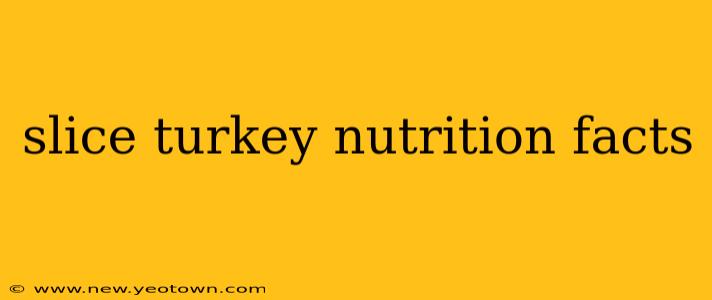Thanksgiving. Christmas. A casual weeknight dinner. Turkey seems to grace our tables for every occasion, and for good reason! It's lean, versatile, and boasts a surprisingly impressive nutritional profile. But what exactly are we getting when we slice into that juicy bird? Let's explore the world of turkey nutrition facts, beyond the simple "it's healthy" assumption.
This isn't just another nutrition label; it's a story about the nutritional power packed into this Thanksgiving staple (and so much more!). We'll uncover the secrets behind its benefits, address common questions, and arm you with the knowledge to make informed choices about this protein powerhouse.
What are the nutritional benefits of eating turkey?
Turkey is a nutritional superstar, shining bright with a wealth of vitamins and minerals. Imagine a lean protein source brimming with selenium, niacin, and vitamin B6, all vital for energy production, immune function, and maintaining healthy nerve cells. It's also a good source of phosphorus and zinc, essential for strong bones and a robust immune system. The benefits aren't just limited to vitamins and minerals; the lean protein itself supports muscle growth and repair, keeping you feeling strong and energized.
How many calories are in a slice of turkey?
The calorie count in a slice of turkey varies significantly depending on the type of turkey (white meat vs. dark meat), the cut, and the preparation method. A 3-ounce serving of roasted, skinless white meat turkey breast typically contains around 100-130 calories. However, adding skin dramatically increases the calorie count, as does breading or frying. Therefore, "a slice" is a rather vague measurement. To get a precise understanding, it's best to weigh your turkey slices and check the nutrition information per ounce or per serving size on the packaging or using a nutrition calculator that accounts for your exact preparation method.
Is turkey breast healthier than dark meat turkey?
This is a common question, and the answer isn't as straightforward as "one is definitively better." Both white and dark meat turkey offer nutritional advantages. White meat, like the breast, is generally lower in fat and calories. Dark meat, however, like the thighs and legs, contains higher levels of iron and zinc, which are crucial for red blood cell production and immune function. The best choice depends on your individual dietary needs and preferences. A balanced approach, incorporating both white and dark meat, could provide the widest array of nutrients.
How much protein is in a slice of turkey?
Similar to the calorie count, the protein content in a slice of turkey varies based on the size and type of cut. A 3-ounce serving of roasted, skinless white meat turkey breast usually packs about 25-30 grams of protein—a significant contribution to your daily protein needs. Dark meat generally has a slightly lower protein content per ounce, but still provides a respectable amount. Always check the nutrition facts label for the most accurate information based on the specific slice or serving size you're consuming.
Is turkey good for weight loss?
Turkey can certainly be a valuable ally in your weight loss journey. Being a lean protein source, it keeps you feeling full and satisfied for longer, preventing overeating. The high protein content also boosts your metabolism and helps preserve muscle mass during weight loss. Remember, portion control is key. Choose lean cuts, prepare your turkey healthily (avoid excessive added fats and oils), and enjoy it as part of a balanced, calorie-controlled diet.
What are the potential downsides of eating too much turkey?
While generally beneficial, overconsumption of anything can have drawbacks. High intake of turkey can, in rare cases, trigger allergic reactions in sensitive individuals. The high purine content in turkey might also be a concern for people with gout, as purines break down into uric acid, potentially exacerbating gout symptoms. Moderation is always advised.
This journey into the world of turkey nutrition reveals that this beloved bird isn't just a holiday centerpiece; it's a versatile and nutritious protein that deserves a prominent place in your diet year-round. Remember to always check nutrition labels and choose your cuts and cooking methods wisely to maximize the benefits. Enjoy your next slice of turkey knowing you're indulging in a delicious and nutritious treat!

